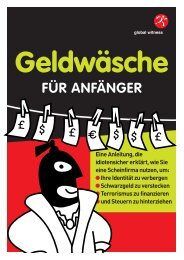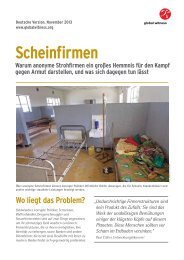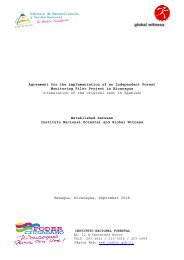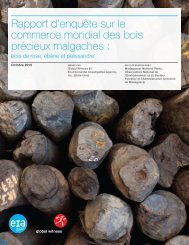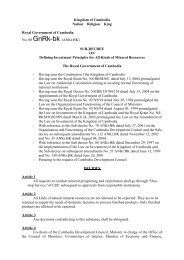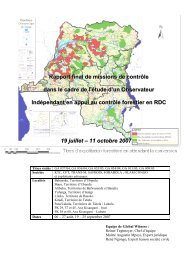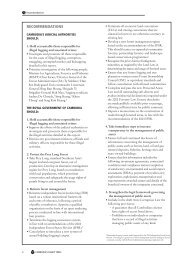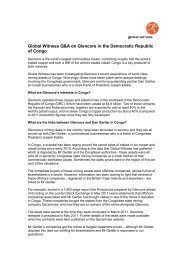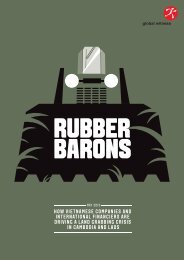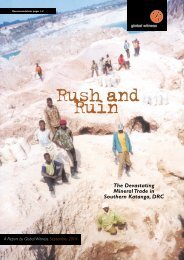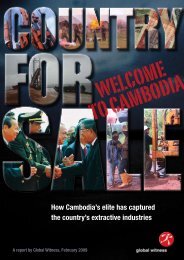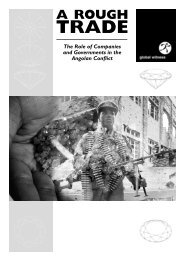03sep3 Conflict of Interests 60-89.pdf - Global Witness
03sep3 Conflict of Interests 60-89.pdf - Global Witness
03sep3 Conflict of Interests 60-89.pdf - Global Witness
Create successful ePaper yourself
Turn your PDF publications into a flip-book with our unique Google optimized e-Paper software.
Part Two: Logging in Burma / 17 The Thai-Burma Border<br />
17.8.4 The problem <strong>of</strong> ‘Old Logs’<br />
The issue <strong>of</strong> importing old logs from Burma emerged in<br />
about 1996. Old logs come in two forms: those that<br />
have been cut for some time and those that have yet to<br />
be cut. The former type <strong>of</strong> old logs, in the Thai/Burma<br />
context, are those that companies with SLORC-era<br />
logging concessions were forced to abandon because <strong>of</strong><br />
fighting, or logs that have been seized from insurgent<br />
groups by the SPDC. 248 In the latter case a request to<br />
collect and/or import ‘old logs’ is used as an excuse for<br />
renewed cutting and the logs in question do not in fact<br />
exist at the time the request was made.<br />
Undoubtedly there have been genuine old logs on<br />
the Thai/Burma border but their true volume is not<br />
clear. In February 2000 1,400 Karen refugees were<br />
moved from a temporary camp in Ratchaburi district<br />
and this appears to have been related to the presence <strong>of</strong><br />
70,000 logs left across the border. 249 People are <strong>of</strong>ten<br />
moved not because they are really causing<br />
environmental damage to the area, but because their<br />
presence makes illegal activities less viable. Many old<br />
logs have already been moved or destroyed. In 2001 the<br />
Karenni National Peoples Liberation Front (KNPLF),<br />
an SPDC-allied ceasefire group, rebuilt a road near the<br />
Thai border and removed logs that were previously cut<br />
by the Pathumthani and STB companies during the era<br />
<strong>of</strong> <strong>of</strong>ficial logging concessions. Karenni sources state<br />
that the SPDC allowed the KNPLF to remove the logs<br />
because it was unable to remove the logs itself, but also<br />
to create tensions between the KNPLF and the<br />
KNPP. 250 In May 2001, the Polpanna Company was<br />
reported to have lost 1,000 logs in a ‘bushfire.’ 251<br />
The Kayah Pu Logging Company’s Hpasawang logging area.<br />
y $1 = 37 baht in 1999.<br />
69<br />
A CONFLICT OF INTERESTS<br />
In March 1999 Thai log importers threatened to sue<br />
government agencies if they prevented the companies<br />
from bringing in 1.41 million m 3 <strong>of</strong> timber, worth more<br />
than 30 billion baht ($810 million), y from Burma. 252 In<br />
July 1999 the Bangkok Post reported that the Polpana,<br />
B&F Goodrich, SA Pharmaceutical, and Songkhrao<br />
Sahai Ruam Rop Kaolee (Thai-Korean War Veterans<br />
Welfare Co.) companies had asked permission to import<br />
up to 1.5 million Burmese logs. 253 It is not clear if this<br />
article was referring to the same logs, but this is likely.<br />
Some logs were exported but not in such large<br />
quantities. In any event it is <strong>Global</strong> <strong>Witness</strong>’ view that<br />
the majority <strong>of</strong> the logs never actually existed.<br />
Permission was sought to import <strong>60</strong>,000 m 3 from<br />
Burma through Mae Hong Son Province again in 2000.<br />
The four Thai firms involved in this case were Polpana,<br />
B&F Goodrich, SA Pharmaceutical and Thai-Korean<br />
War Veterans Welfare Co. 254<br />
<strong>Global</strong> <strong>Witness</strong> first came across SA<br />
Pharmaceutical in 1996 when it was involved in a<br />
similar scam to import ‘old logs’ from Cambodia. Log<br />
exports from Cambodia had continued until January<br />
1995 when the Royal Government <strong>of</strong> Cambodia<br />
(RGC) imposed a complete log and sawn timber<br />
export ban. This ban was breached on numerous<br />
occasions because Thai logging companies, using the<br />
pretext that the ban had stranded logs that had already<br />
been cut, successfully lobbied for ‘exceptions’. These<br />
exceptions took the form <strong>of</strong> a special permission<br />
issued by the RGC allowing the companies to export<br />
‘old felled’ logs. The loggers would, in fact, enter<br />
Cambodia and fell new logs. Typically a few months<br />
© Karenni Evergreen



